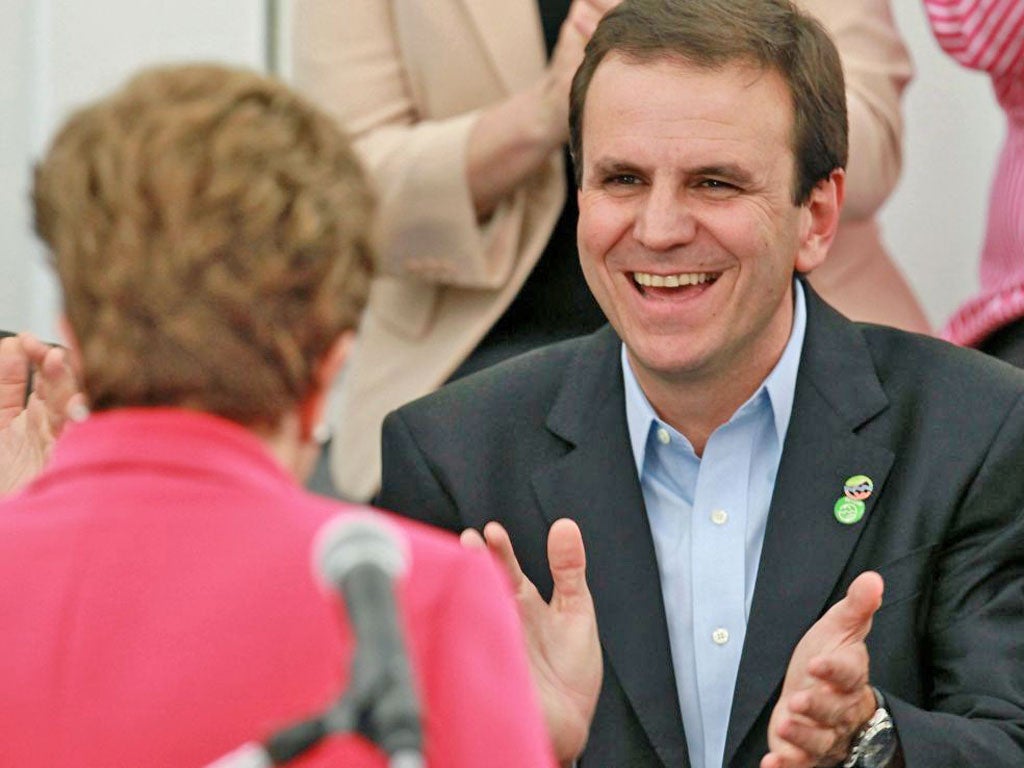London 2012: Mayor of Rio says he's scared Boris Johnson will 'do something crazy' when he hands over Olympic flag to Brazil

The Olympics may have just begun but Eduardo Paes has already got his eye on the end.
When the curtain comes down at the closing ceremony in just under two weeks, it will be he who picks up the Olympic flag from Boris Johnson. As the mayor of Rio, the hosts in four years’ time, his team will soon be the ones frantically trying to make sure that Brazil’s sprawling cultural capital becomes a truly Olympic venue.
“Boris did a great job,” he told The Independent on his visit to London for the start of the Games.
“He got the city into the mood of the Olympics and did great things. I’m just scared he’ll do something crazy when he hands over the flag.”
He adds of Boris: “He’s crazy.”
In many ways Paes is Brazil’s Boris. He is a plain-spoken, charismatic politician with a notoriously wicked sense of humour. But the trials London faced in staging such an event pale into comparison with the hurdles Rio has to jump.
Much of the debate with London 2012 centred around whether the capital’s transport network would cope with the influx of one million extra visitors. But at least they city had some sort of network in place. Rio is pretty much starting from scratch.
“Right now we carry only 18 per cent of our population in high capacity transportation,” he admits. “By 2016 we’re going to move to 63%. That will be a revolution. But it all needs to be built.”
The Olympic Park will be built on the city’s former Formula One racing track, a wide expanse of government owned land to the west of the capital that lies next to a lagoon. Over the years hundreds of poor and middle class families have built illegal settlements near the race track. Plans to move them on have drawn protests, but Paes insists the inhabitants will be given alternative accommodation.
“Here’s where we’re different from the Chinese Olympics,” he explains. “In a very democratic way we are putting up 500m away some very nice condominiums with some very nice apartments and we’re going to put people there. Only when they are ready. People complain, they don’t believe it will be done but it’s a compromise Rio will deliver on.”
For many outside Brazil the image Rio conjures in their minds is a pristine stretch of beach fringed by gleaming skyscrapers which are themselves surrounded by sprawling and often violent favelas of the sort portrayed in the seminal movie City of God. It is an image many Brazilians understandably balk at, especially now that an initially controversial “favela pacification” programme appears to be paying dividends.
Over the past three years specialist army and police units have deliberately pushed into some of the city’s most violent slums to take on the drug lords who have by and large put up little resistance. The state then floods the area with public services that barely existed. It’s expensive but crime and homicide rates have plummeted.
“It was like in parts of the city state sovereignty was simply not there,” he admits. “It was dominated by drug dealers. This is changing completely and it’s moving fast.”
There have been bumps along the way. Last week a police officer was gunned down in Alemao, a slum that has been supposedly cleared. But Luis Fernandez, the country’s deputy minister of sport, insists tackling violent favelas must continue. “It’s not so much for the tourists but for Brazilian people who have a right for safety,” he says. “Whereas before for very poor or destitute youngsters the role model would be the drug lord – because he had easy access to money and prestige – it’s now working the other way around.”
For Mr Paes the Olympics is an opportunity for his city to completely reinvent itself. “Rio is a nice party city in South America,” he says. “We want to great party city in South America with good infrastructure, people living well and a good place to do business. London is already on that level.”
Join our commenting forum
Join thought-provoking conversations, follow other Independent readers and see their replies
Comments
Bookmark popover
Removed from bookmarks